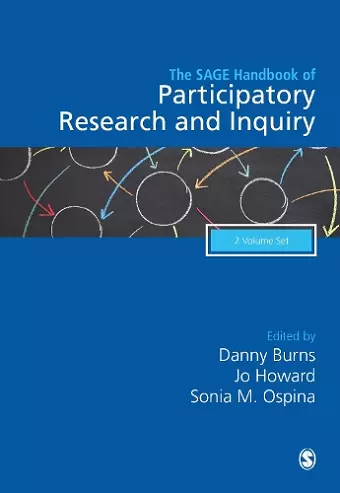The SAGE Handbook of Participatory Research and Inquiry
Danny Burns editor Jo Howard editor Sonia Ospina editor
Format:Set / collection
Publisher:Sage Publications Ltd
Published:2nd Sep '21
Should be back in stock very soon

This SAGE Handbook presents contemporary, cutting-edge approaches to participatory research and inquiry. It has been designed for the community of researchers, professionals and activists engaged in interventions and action for social transformation, and for readers interested in understanding the state of the art in this domain. The Handbook offers an overview of different influences on participatory research, explores in detail how to address critical issues and design effective participatory research processes, and provides detailed accounts of how to use a wide range of participatory research methods. Chapters cover pioneering new participatory research techniques including methods that can be operationalised at scale, approaches to engaging the poorest and most marginalised, and ways of harnessing technologies to increase the scope of participation, amongst others.
Drawing upon a wide range of disciplines, and bringing together contributing authors from across the globe, this Handbook will be of interest to an international readership from across the broad spectrum of social sciences, including social policy, development studies, geography, sociology, criminology, political science, health and social care, education, psychology, business & management. It will also be an insightful and practical resource for facilitators, community workers, and activists for social change.
Part 1: Introduction
Part 2: Key Influences and Foundations of Participatory Research
Part 3: Critical Issues in the Practice of Participatory Research
Part 4: Methods and Tools
Part 4.1: Dialogic and Deliberative Processes
Part 4.2: Digital Technologies in Participatory Research
Part 4.3: Participatory Forms of Action Orientated Research
Part 4.4: Visual and Performative Methods
Part 4.5: Participatory Monitoring, Evaluation and Learning
Part 4.6: Mixing and Mashing Participatory and Formal Research
Part 5: Final Reflections
This rich, inspiring collection is testament to the extraordinary creativity of those who have brought about a veritable revolution in research through participatory methodologies and approaches. Drawn from across the globe, contributors attest to the power of participatory research and inquiry its enduring value as a catalyst for change -- Professor Andrea Cornwall
This Handbook makes a state of the art contribution to this popular field grounded in 50 years of in-depth experience and spanning to some of its newest insightful practitioners. A landmark achievement.
-- Yoland Wadsworth
Participatory research has become a cornerstone of co-designing respectful and effective cooperation initiatives in the last twenty years. This comprehensive Handbook offers an invaluable compilation and review of how this can be approached in a multi-disciplinary way in different settings, and should be an essential and well-thumbed reference guide for students and practitioners alike.
-- Paul LaddThis new collection of articles on participatory research from new generation of researcher-activists is heartily welcome. With a wide variety of epistemological and contextual locations, the collection will inspire continued creativity and plurality in the elaboration of participatory research. Hopefully, the transformational potential of participatory research will begin to contribute to post-pandemic, resilient and fairer reconstruction of societies around the world. -- Rajesh Tandon
Recognising the ever-pressing need for research approaches that can assist, support, or facilitate processes of social transformation across different contexts, problems, inequalities, exclusions, and injustices, the editors and authors of The SAGE Handbook of Participatory Research and Inquiry exhibit the historical trajectories, wealth, diversity, and practicalities of participatory research. In traversing the roots of participatory research through its progression and expansion with theoretical orientations, political and ethical commitments, contextual and disciplinary articulations, and specific methods, readers can find exceptional coverage of past and current iterations of the research practice recognised broadly under the umbrella of participatory research. This text is a valuable guiding resource for researchers, doctoral students, and all who undertake participatory research and its many and varied forms, aims, subtleties, challenges, and potentials.
-- Bryan C. CliftAchieving the 2030 Agenda for Sustainable Development and meeting commitments to the Paris Agreement requires impactful solutions that reach the poorest and most marginalized to deliver on the promise of the SDGs to leave no one behind. With the COVID-19 pandemic and its impacts on rising poverty and hunger, the climate crisis and increasing environmental pressures, we must redouble our efforts to achieve our goals. This requires drawing on the richness of ideas and experiences across communities, including young people, women and girls and indigenous peoples, for a deeper understanding of their challenges and what works in practice to overcome them, so we can act on that knowledge to create a sustainable and inclusive future for all.
Participatory research is an essential tool to deliver on that objective. Participatory research sets out open and inclusive approaches that engage the poorest and most marginalized – so we can gain knowledge and understanding of the issues that affect their lives and turn those into action. Participatory research empowers young people to learn and apply research techniques to discover solutions for their own issues – grounded in the belief that youth are valuable experts and that power between youth and adults should be shared. It can support governments in establishing better ways of listening to people whom they are meant to serve and taking their views into account, especially groups that are frequently overlooked. This is essential to rebuild trust and foster a renewed social contract between governments and their people and within societies.
This Handbook provides a comprehensive overview of different participatory research methods that researchers with varied expertise in the field can use to support the type of social transformation that we need. I encourage all researchers to make full use of it to accelerate achievement of the SDGs and fulfil the Paris Agreement towards a better, more sustainable and peaceful future for our people and planet. -- Amina J. Mohammed
ISBN: 9781526440501
Dimensions: unknown
Weight: 2380g
1168 pages